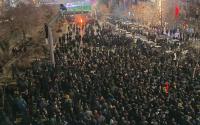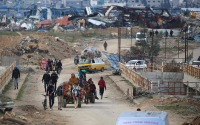Common Dreams / Published on Saturday, June 3, 2006 by the Toronto Star
Even by the legendary standards of the U.S. Marine Corps, where kinship and camaraderie have long been celebrated, the men of Kilo Company were extraordinarily tight, a real life band of brothers.
They were a family of young men, some with ties dating back to boot camp, all with allegiances forged in the daily battle for survival where friend was indistinguishable from foe in one of the most frightening and deadly areas of Iraq.
When they lost one of their own last November, they had, said one, "lost a brother from a different mother.''
One member tattooed the name of the fallen soldier, Lance Cpl. Miguel (T.J.) Terrazas, on his arm and the dead soldier's family in El Paso, Tex., was swamped with cards, banners and tributes to the man who, his sergeant said, "brought a smile everywhere he went.''
But when Kilo Company first came upon the lifeless, mangled body of their comrade, "a giant hole in his chin, his eyes rolled up in his skull,'' as one put it, they may have had a much more base reaction to the sudden death of T.J.
"I think they were just blinded by hate ... and they just lost control,'' said Lance Cpl. James Crossan of Washington State, himself badly injured when the Humvee convoy was blown apart by a bomb imbedded in the dusty Haditha road.
Maybe they just snapped that day in Haditha, going from home to home firing at unarmed women, children, an old man in a wheelchair, then five youths who happened on the scene until, their vengeance finally sated, they began an elaborate cover-up that endured against all odds for almost three months.
Just cracked.
"After 12 to 18 months over there, you can crack,'' says Jon Soltz, an Iraq war veteran who now heads a political action committee for other vets.
"In Iraq, everyone is a killer. No matter how much training you have, after that length of time in that atmosphere, you can't train someone not to crack.''
The alleged Haditha massacre, which left 24 Iraqis dead, had already shaken this country.
It had particularly rattled Marine veterans so proud of their almost mythical, professional warrior tradition.
But just as they were trying to make sense of what happened that morning of Nov. 19, 2005, more allegations surfaced adding up to perhaps the darkest week for the U.S. military since it began operations in Afghanistan and Iraq in 2003.
Seven other Marines and a navy corpsman are being held and could face murder, kidnapping and conspiracy charges in connection with the April 26 killing of an unarmed Iraqi man in Hamandiya.
Investigators say those being held at Camp Pendleton, Calif., may have placed a shovel and an AK-47 near the body to make it appear he was an insurgent planting a bomb.
The military was also forced to take another look at charges that 11 Iraqi civilians, including women and children, were gunned down March 15, 2006 in Isahaqi, north of Baghdad. The incident was originally described by American authorities as a firefight that killed four Iraqis, including an Al Qaeda-linked insurgent holed up in a private home.
Late yesterday, the U.S. defence department said its probe cleared the troops of misconduct, despite dramatic video footage of slain children.
After being fired on, the soldiers called in air strikes by an air force gunship, which attacked and collapsed the building, the defence officials said.
Local Iraqis said the 11 civilians were killed by U.S. troops before the house was levelled.
The bloody aftermath of the attack was captured at the time in video footage shot by an AP Television News cameraman. The footage shows at least one adult male and four of the children with deep wounds to the head that could have been caused by bullets or shrapnel.
In Samarra, north of Baghdad, two Iraqi women, including one about to give birth, were shot and killed by U.S. troops this week.
That, too, is under investigation.
And in Afghanistan, U.S. troops are fending off allegations that they fired into a crowd — not over their heads, as they said — after a military vehicle crashed into cars in Kabul, triggering a riot.
Since the sordid tale of Haditha started dripping out, no one, from U.S. President George W. Bush on down, has suggested the media has overreached.
"In conflicts things that shouldn't happen, do happen,'' said a sombre Defence Secretary Donald Rumsfeld.
A senior commander on the ground was more specific.
"When you're in a combat theatre dealing with enemy combatants who don't abide by the law of war, who do acts of indecency, soldiers become stressed, they become fearful,'' said Brig.-Gen. Donald Campbell. "It's very difficult to determine in some cases on this battlefield who is a combatant and who is a civilian.
"It doesn't excuse the acts that have occurred, and we're going to look into them. But I would say it's stress, fear, isolation and, in some cases, they're just upset.
"They see their buddies getting blown up on occasion, and they could snap.''
But revenge is not supposed to be in the Marine playbook.
It happens, analysts say, because U.S. soldiers are overstretched in Iraq.
They are back for second, sometimes third tours of duty.
In Haditha, most of Kilo Company were at least on their second tour, after only seven months in between, returning to an area that had been a killing field for Marines — six were killed in only three days last August and 14 perished in one blast last summer, the deadliest roadside bomb attack in the Iraq war.
They are fighting an insurgency that plays by no rules and shields themselves behind innocent civilians.
"I can understand how you can snap," said Aine Donovan, a former U.S. Naval Academy professor who now heads the Ethics Institute at New Hampshire's Dartmouth College. "How many tours of duty should we expect of our young men? Every time you send them back there, you are pushing the limits of probability," Gary Solis, a former Marine and West Point Academy instructor who now teaches the law of war at Georgetown University law school, says it is particularly painful for a Marine to think one of his own may have committed such a crime.
"We are the elite. Professionalism is stressed," he said. "And when you have to exercise that professionalism is when the guy beside you has been shot up. You don't turn around and start shooting everyone in sight.''
The Marine determination to protect each other may also explain what appears to be an elaborate cover-up.
When Time magazine first inquired about the allegations of murder, it was told it was being played as a dupe.
Another military representative, the magazine reported, told its reporter that civilian deaths were caused by the insurgents placing the Iraqis in the line of Marine fire.
But the story began to unravel.
A decision up the chain was made to pay families of victims a total of $38,000 (U.S.) — $2,000 per head for all those killed in their homes, a practice that usually indicates compensation for wrongful deaths.
A military probe has already concluded those involved on the ground lied to superiors and those superiors did not really study the report of the incident to look for any holes.
All this has made it difficult for the grieving Terrazas family in El Paso to move on with their lives.
Miguel Terrazas' brother, Martin Terrazas Jr., told National Public Radio he doesn't believe his brothers' buddies avenged his death with a bloodbath.
But he also said he knew the realities of war.
"These guys are trained to go out there and fight,'' he said. "That's their job and that's what they're going to do. And for war, I guess it's either their kids or our kids, you know? It's their blood or our blood.''






